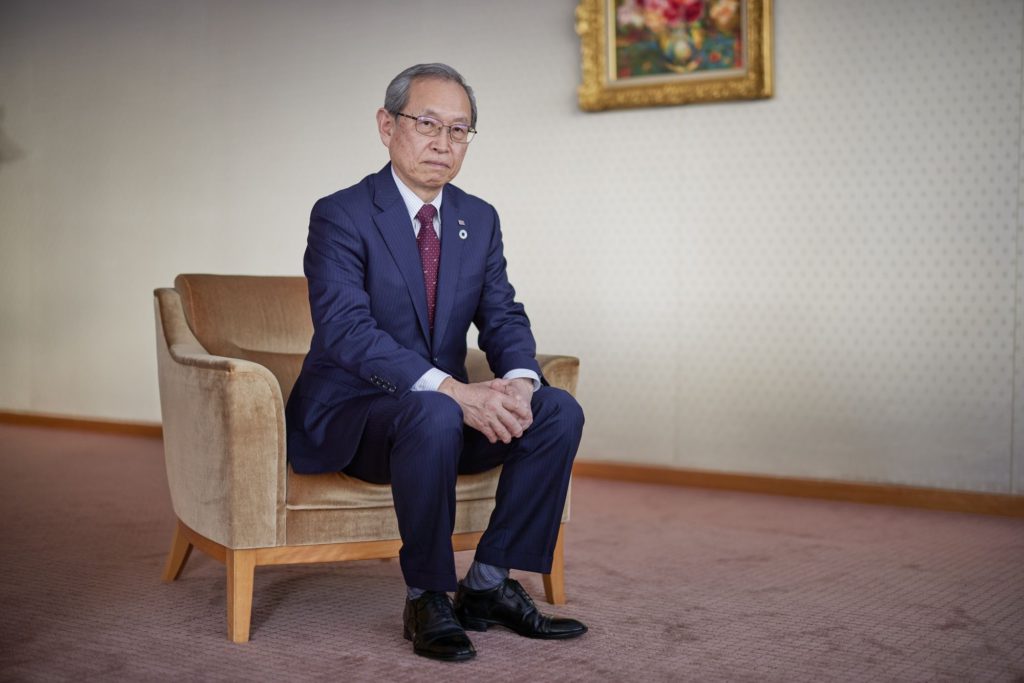(Bloomberg) — Toshiba Corp.’s top executive said selling the Japanese conglomerate to a fund and taking it private would be full of drawbacks that he can’t condone, stressing that splitting into two companies is the best plan even as activist investors call for a reopening of talks with private equity buyers.
“We are not ruling out privatization and will consider it if a proposal is made, but the option has about five risks,” Chief Executive Officer Satoshi Tsunakawa said in an interview with Bloomberg News in Tokyo. It “would be impossible for us to ignore” them, he said.
The CEO’s comments come as the latest showdown looms between the troubled company and its activist investors. Toshiba has called a shareholder meeting for March 24 to gauge investor support for its revised plan to separate into two entities. But a competing proposal from Singapore-based 3D Investment Partners Pte seeks for Toshiba to launch a review to reconsider alternative options.
Tsunakawa, 66, said Toshiba would lose orders from public entities ranging from utilities to local governments if it went private through a sale to a fund, depriving it of an important source of cash flow.
The company would also be forced to sell sensitive technology operations in areas such as nuclear, defense and cybersecurity, all of which are essential to its sustainable growth, he said.
And if the fund uses leverage to do the buyout, it may sacrifice research and development spending to focus on repaying debt, Tsunakawa said.
On top of that, the process of going private would take too long, he said.
But the biggest concern of all is that a sale to a fund may lead to an exodus of staff, Tsunakawa said.
“I can’t push our employees down this thorny path,” he said.
Toshiba received an early takeover proposal from Blackstone Inc. in January, local media Nikkei BP reported last week, a claim that both Toshiba and Blackstone quickly dismissed as untrue.
Toshiba originally announced in November that it would split into three firms, but revised that plan this month, saying it would divide into two companies instead because that would be cheaper and smoother.
The March vote on the separation plan isn’t legally binding and will only require a simple majority to pass. The ultimate vote on the split won’t take place until June next year.
Read more: Toshiba to Hold Shareholder Meeting in March on Split Plan
One of the company’s largest investors is against the revised plan, a person familiar with the matter said. A vote against Toshiba’s proposal and for 3D’s would be a good outcome for shareholders and would quickly lead to a privatization, the person said, asking not to be identified because the information is private.
Toshiba, once among Japan’s most revered companies, has been in crisis mode for years due to repeated scandals and management missteps. It invented flash memory for computing, but had to sell control of its crown jewel semiconductor business to pay for a disastrous expansion in nuclear power.
That deal opened the door to activist investors. They include Effissimo Capital Management Pte and 3D, which are the two largest shareholders with 10% and 7.6% stakes respectively, according to data compiled by Bloomberg.
That in turn led to a proxy fight at a 2020 shareholder meeting, where company executives and high-level government officials were found to have colluded to influence voting.
But despite the friction with its investors, Tsunakawa said he expects the company’s separation plan to be approved.
“This is the last chance for Toshiba to change for good,” he said. “I’m confident that our shareholders will be with us.”
More stories like this are available on bloomberg.com
©2022 Bloomberg L.P.











